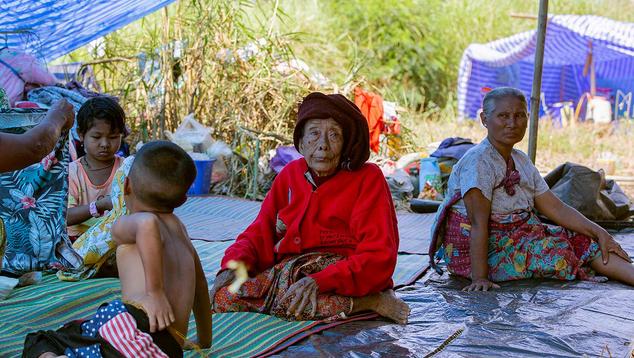Story Highlights
- Number of people wanting to leave quadrupled in 2021
- Loss of freedom, insecurity are driving more people to want to leave
- Failing economy offers little incentive to stay
Feb. 1 marks the first anniversary of the military coup in Myanmar. This article is part of a series on what life has been like for people in Myanmar during the year of turmoil since the military takeover.
WASHINGTON, D.C. -- Reveling in the newfound freedom they felt after Myanmar emerged from decades of military rule in 2011, few people expressed a desire to leave their country. Until now.
The number of people who said they would leave Myanmar exploded after the military coup a year ago, quadrupling from 6% in 2018 to a record 24% in late 2021.
Hundreds of thousands have fled Myanmar since the military takeover last February -- but if everyone who wanted to leave Myanmar did, these numbers could stretch into the millions.
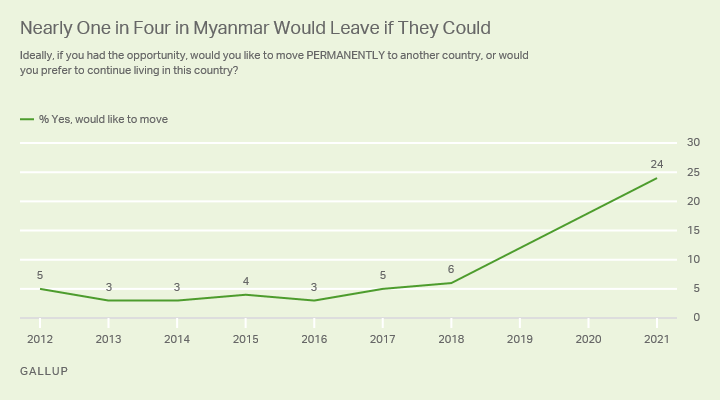
Line graph. Trend line showing the sharp increase in the percentage of people in Myanmar who would like to leave their country permanently, if they could, from 2012 to 2021. A record-high 24% in 2021 said they want to leave, up from the previous reading of 6% in 2018.
Gallup's interviews in Myanmar in 2021 took place roughly seven months after the military junta seized power from the country's civilian government. The February coup effectively ended a decade of quasi-democracy and freedom that gave people in the previously isolated country a window to the world.
In its place, Myanmar residents were left with a country on the verge of collapse. Violence and insecurity followed the coup, and freedoms people had enjoyed for a decade disappeared. The country's economy, which had been improving, tanked under added pressures from the COVID-19 pandemic.
Myanmar Residents Lose Freedom, Desire to Stay
People's satisfaction with their personal freedom soared after military rule ended in 2011, rising from 65% in 2012 to as high as 89% in 2018 and 2019. But after the coup stripped them of their rights, their satisfaction looked more like it did in 2012 -- 63% were satisfied. And they were more dissatisfied than ever.
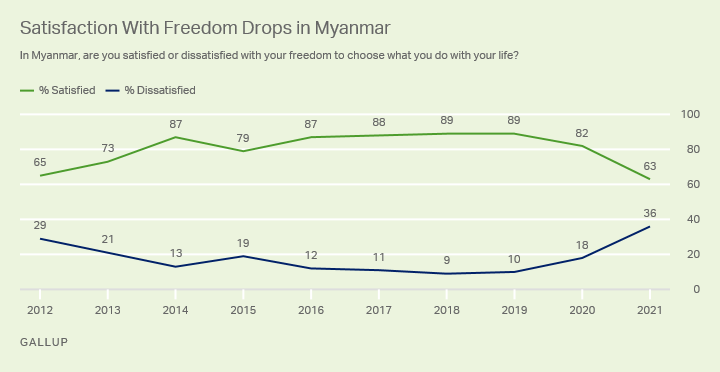
Line graph. Trend line showing the decline in Myanmar in people's satisfaction with their freedom to choose what they do with their lives, from 2012 to 2021. A record 36% were dissatisfied in 2021, up from 18% in 2020 and 10% in 2019.
This loss of freedom likely contributed to the surge in people wanting to leave Myanmar in 2021. People who were dissatisfied with their personal freedom were nearly three times more likely than those who were satisfied to say they would like to leave (39% versus 15%).
Fewer People Feel Safe, More Want to Leave
The deteriorating security situation in Myanmar also likely contributed to more people wanting to leave the country. More than 1,000 people have been killed since the coup, and tens of thousands more have fled the intensifying violence between the military and anti-junta militias.
With bombings and shootings becoming almost everyday occurrences, most people in Myanmar no longer feel safe. A record-high 59% in 2021 said they do not feel safe walking alone at night where they live.
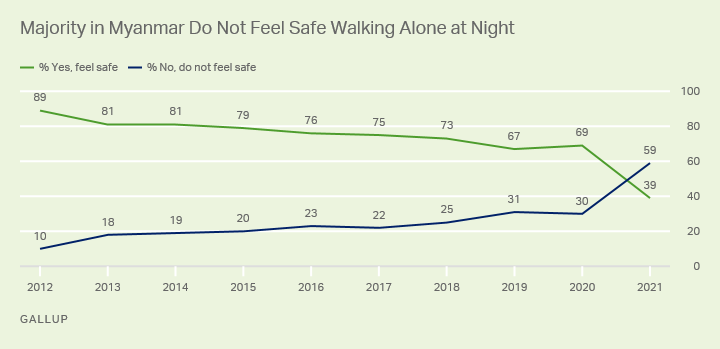
Line graph. Trend line showing the sharp decrease in the percentage of people in Myanmar who say they feel safe walking alone at night in the area where they live, from 2012 to 2021. In 2021, a record-low 39% said they feel safe and a record-high 59% said they did not.
People who don't feel safe are more than twice as likely to want to leave. Nearly one in three (32%) people in Myanmar who did not feel safe where they live said they would leave if they could -- more than double the 14% who felt safe and still wanted to leave.
Failing Economy Offers Little Reason to Stay
In addition to insecurity, Myanmar's economy since the coup has offered little incentive for people to stay. The country's economy was expected to contract about 18% in 2021, largely because of the coup and COVID-19.
People's economic outlooks soured during the first year of the pandemic in 2020, but they were abysmal in 2021. At the end of the year, more than two in three (69%) said their economy was getting worse. Those who saw the economy getting worse were nearly three times more likely to want to move (29%) than those who said it was getting better (11%).
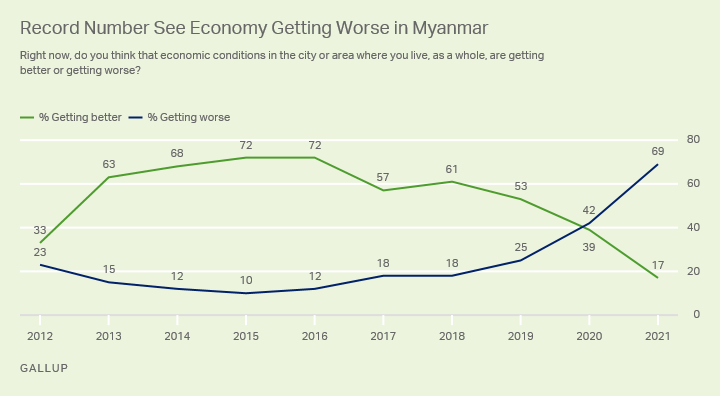
Line graph. Trend line showing the increase in the percentage of people in Myanmar who see economic conditions in the city or area where they live as getting worse, from 2012 to 2021. A record 69% said conditions were getting worse in 2021.
Young, Educated in Myanmar Most Likely to Want to Leave
Young people in Myanmar and the country's most educated would likely be leading the exodus, which is not unusual, but problematic nonetheless for Myanmar's future sustainability. More than three in 10 15- to 29-year-olds (31%) say they would leave the country if they could, as would 34% of those with at least a secondary education.
If they could go anywhere, those who want to leave Myanmar name Japan, the U.S. and South Korea as their top destinations. But as the recent flood of refugees to nearby India and Thailand shows, Myanmar's neighbors are the ones absorbing the immediate surge of people, and this could continue if more follow in their footsteps.
Implications
With Myanmar on the edge of collapse after the coup, the sudden surge in people wanting to leave is not a shock but a signal of how dire and intractable the situation has become. And as bad as the past year has been, the U.N. recently warned the country will be facing an "unprecedented crisis" in 2022 -- potentially sending more people to the exits. More the half of the country has been pushed into poverty, and people in "14 out of 15 states and regions are within the critical threshold for acute malnutrition."
To stay up to date with the latest Gallup News insights and updates, follow us on Twitter.
For complete methodology and specific survey dates, please review Gallup's Country Data Set details.
Learn more about how the Gallup World Poll works.
